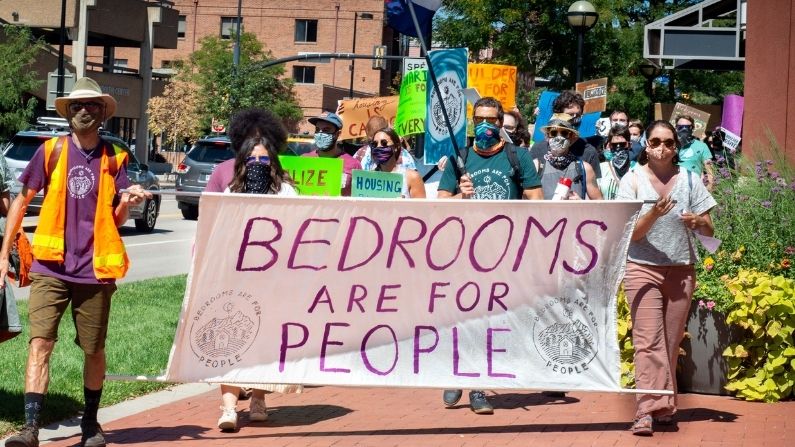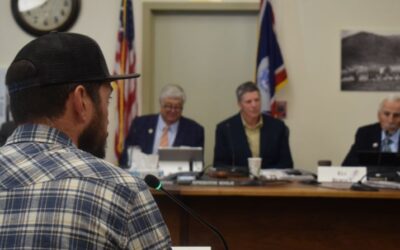Jackson residents have been expressing their mostly negative views on Housing Ordinance 473—the town’s controversial law that officially bans more than three unrelated people from living together in a single-family home—via e-mail for months. But on Monday, April 19, several residents took to Zoom during a public meeting to voice their opinions directly to Town Council for the first time.
“I also know that I’ve broken the law in filling four- to six-bedroom rental homes with more than three people,” said Maddie Johnson.
“I have lost housing due to this ordinance, and I know many other people in this same situation,” testified Ivan Jimenez.
“With our housing crisis, we should let as many unrelated people live as possible live together. It’s the only way people who work here can afford to live here,” said Ash Hemanowski, who was speaking on behalf of Hanna Austin.
It appears likely that the Town Council will remove the definition of “family” from any future zoning laws, which several public commenters described as discriminatory to nontraditional households, like those made up of unmarried partners and/or LGBTQ residents. The more complicated, and controversial, question, though, is whether or not to keep any limits to how many people can live together in a single-family home.
Jessica Sell Chambers was the lone town councilor to vote last week to completely remove occupancy limits from town law.
“If we tried to put an occupancy limit, where do we draw the line there? I mean, we do have families in this town that are eight, 10, 12 people,” she said. “How do we say what is an appropriate occupancy level?”
Other councilors voted to have staff come up with several options of possible new definitions of zoning laws that don’t include the word “family.” Restrictions based on safety regulations, square footage or even the number of kitchens in a house were all floated, and debate about what parameters the town should use is likely to persist for months. However, Jackson’s discussion on this issue has been pretty tame so far compared to what’s happening in Boulder, Colorado.
Chelsea Castellano is a head organizer for Boulder’s Bedrooms are for People campaign. She wants to replace current zoning ordinances in the popular suburb of Denver with a new law that would set the maximum number of people who can legally occupy a house at the number of bedrooms in the home, plus one person.
“Our proposal is a common-sense approach to treating occupancy limits. It’s not arbitrary. It’s tied to the space in a home,” Castellano said. “And while it’s not even as progressive as we would want it to be, we felt that it would make a meaningful impact for the community.”
Like Jackson, Boulder is facing a housing crisis. Many local workers often struggle to find a place to live, and Castellano said people knowingly break the law all the time just to put a roof over their heads.
“We have thousands of people living in our community who are living in fear,” she said, “who are at any moment vulnerable to eviction, [and ] who don’t feel like they can participate in the community fully because they have to live in the shadows because they don’t want to lose their housing.”
A few years ago, Castellano and Eric Budd, another local activist, started knocking on doors, meeting folks outside the grocery store and fighting to change the law. Budd said a crucial difference between the housing ordinances in Boulder and Jackson is that it’s enforced a lot more in Colorado.
“They knock on the door. They essentially schedule a time to come visit the house and they will do things like count beds,” Budd said. “They will count toothbrushes. They will make you prove that you are related to someone else.”
Also unlike Jackson, the Boulder City Council has appeared less open to changing the law. Budd said Bedrooms for People tried to get their initiative on the 2020 ballot, but the Council fought to keep it off. Things got so heated that Budd and Castellano helped sue the city in a case that was eventually dropped. But this year, they’re trying to get it on the ballot again.
“We know that our measure is not going to accomplish all of what we need to do to make Boulder inclusive and affordable,” Budd said. “But we know it’s also one of the best places to start by just allowing people to share housing costs, transportation costs, food [and] child care.”
Castellano added that she hopes Bedrooms are for People can serve as a catalyst for changing zoning laws across the country. When it comes to Jackson, she recommended that local housing advocates keep educating folks about Housing Ordinance 473.
“Honestly, I feel like when you just tell people it’s illegal for four people to live in a four-bedroom house if they aren’t related, they understand that that doesn’t make any sense,” she said. “When we’re doing our quick pitch to people walking in and out of the grocery store, like, you don’t even need to explain why that’s crazy.”
While Jackson town councilors appear to be on board with loosening current restrictions, they said that they’ll be listening closely to public comments about what would be best for this community moving forward. Councilman Jonathan Schecter said he’s excited to remove the definition of family, but he does caution that the town will still be in a housing crisis moving forward, whether or not more than three people can legally live together in a single-family home.
“The best piece of evidence I could point to is that in last Wednesday’s [Jackson Hole] News&Guide, there [were] over 1,000 column inches of help wanted ads, and there was one inch—one column inch—of rental housing ads,” he said. “And that is the all-time low in the 20 plus years that I’ve been tracking that.”
Ordinance 473 is so deeply embedded in town zoning laws that it’ll take at least 90 to 120 days for any changes to be implemented, according to the town’s Community Development Director Tyler Sinclair. Deciding on occupancy limits will likely take longer, giving community members plenty of time to discuss, and present, new ideas on what the future of zoning in Jackson may look like.





